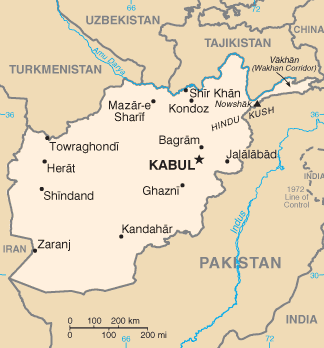Beijing has been increasing engagement with Afghanistan since Xi Jinping became president in 2012, a strategic move for both economic and regional security reasons (China is currently waging a controversial crackdown on terrorism in the Xinjiang region, which shares a small border with Afghanistan, and has claimed that many would-be Uyghur emigres are seeking jihad training in the Middle East). After recent reports suggested Beijing’s possible aspirations to broker peace talks between the Afghan government and the Taliban, last week Foreign Minister Wang Yi stated such intent while on a state visit to Pakistan. The Wall Street Journal looks at the details of China’s increasing engagement, noting the possibility of a U.S.-China alliance in the historically troubled country as the U.S. and NATO begin to withdraw troops. Jeremy Page, Margherita Stancati, and Nathan Hodge report:
China has ruled out sending troops, unless they are part of a United Nations peacekeeping force. One idea by U.S. participants in talks with China is for Beijing to provide Afghanistan with older Russian-designed Mi-17 helicopters, which are similar to aircraft the U.S. has given Afghan security forces.
China’s defense ministry didn’t respond to a request for comment.
[…] Beijing would be hesitant about providing such heavy weaponry, said Hu Shisheng, an Afghanistan expert at the China Institutes of Contemporary International Relations, a think tank linked to the Ministry of State Security.
But he described as “feasible and realistic” the idea of U.S.-China training of Afghan forces outside Afghanistan—helicopter pilots, for example. The two countries are already jointly training diplomats for the Afghanistan government.
[…] “China wants to be a world power. Now it’s going to learn how hard that is, how hard it is to exercise influence and achieve the results you want,” said Mr. Sedney, the former Pentagon official. “I’m not predicting that they’ll fail, but it’s an unknown.” [Source]
At the University of Nottingham’s China Policy Institute blog, professor Shaun Breslin looks at the geopolitical implications of Beijing becoming Washington’s “deputy” in Afghanistan:
[…] Chinese strategists refer to the current era as one of strategic opportunity. Not least because of the consequences of the global financial crisis, a global power change has been accelerated, that has seen China rise while existing powers (most notably in Europe) decline. This has created a great opportunity for China to push to change the global order to one that is more reflective of Chinese power and Chinese interests.
But this opportunity is constrained by the residual power of the US which will remain, in Chinese eyes, the predominant global power for some time to come. Indeed, vice premier, Wang Yang, said as much in Chicago in December when he reaffirmed China’s commitment to a US-led rule based world order which China has “neither the ability nor the intent” to overturn.
The challenge for China is not (yet) how to replace the US, but how to act as its No.2. In the case of Afghanistan, the No.1 seems relatively comfortable with a greater Chinese role. But it’s not always the case that the No.1 seems amenable to accommodating China’s further rise. Where it isn’t, China has begun to take action to build its own alternatives.
So if the US won’t ratify changes to voting power at the IMF that would give China a greater say – and the power structure at the ADB continues to favour others – then China is prepared to launch its own organ of financial governance in the form of the Asian Infrastructure Investment Bank. Here we see China competing for some form of leadership by replicating existing ways of doing things, rather than trying to fundamentally challenge the very nature or essence of global governance and the global order. […] [Source]







